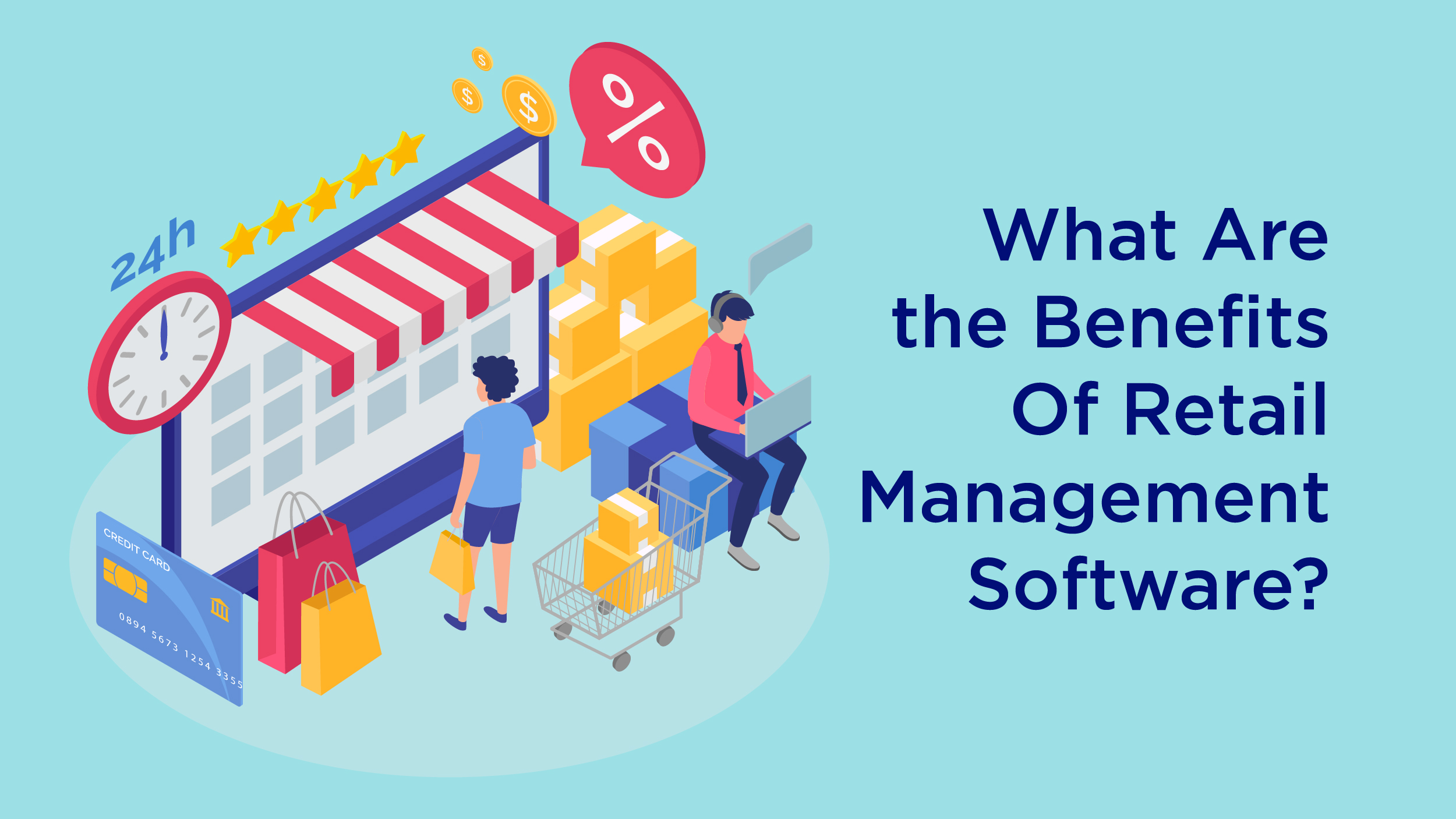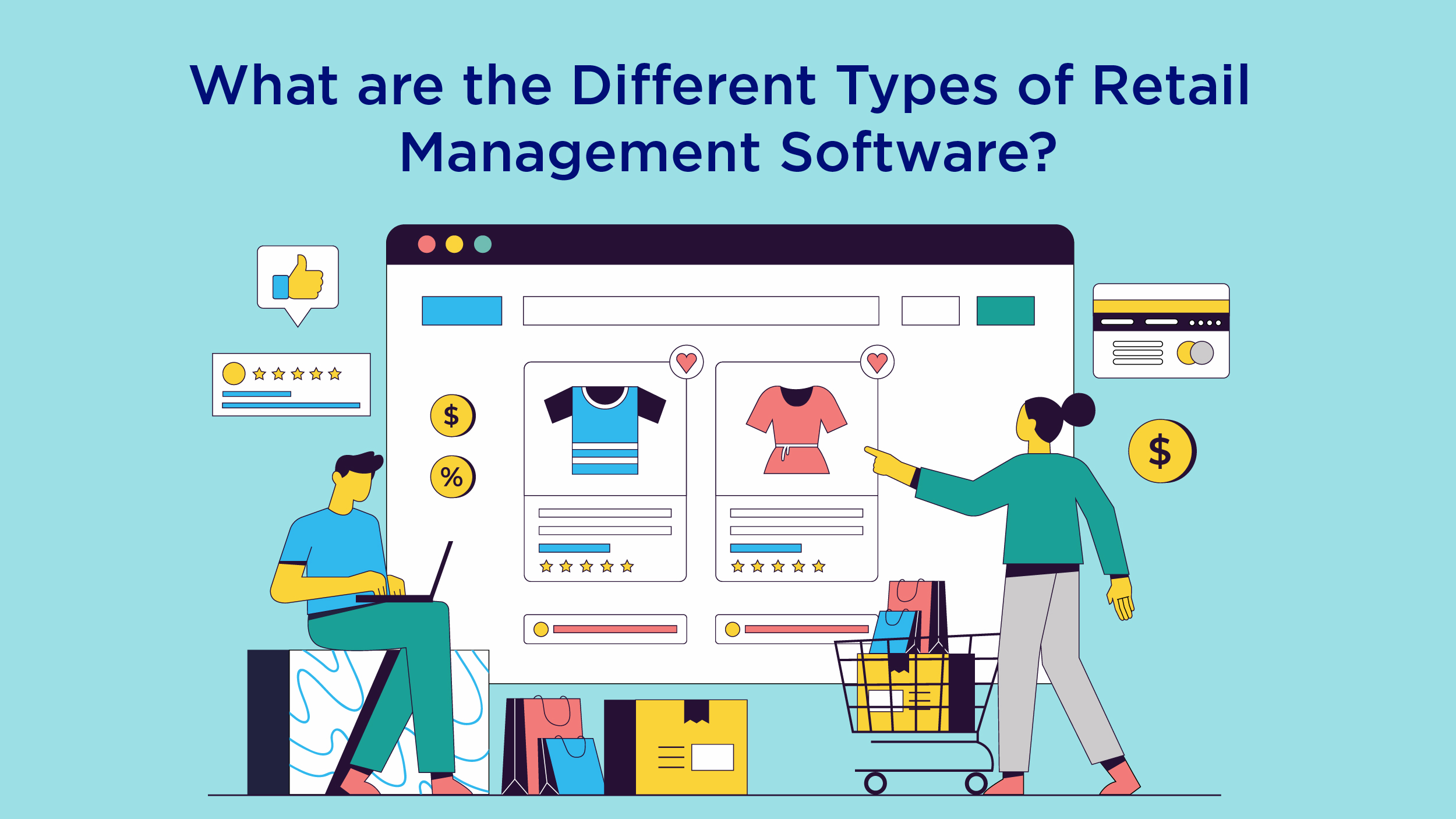In today’s fast-paced retail industry, managing operations, inventory, and customer data can be a daunting and complex task. Retailers often struggle with manual processes, outdated systems, and a lack of real-time visibility, leading to inefficiencies, errors, and missed opportunities. But fear not, because there’s a solution that can revolutionize the way retailers operate and thrive in this competitive landscape – retail management software (RMS). Let’s learn everything about it.
What Is Retail Management Software?
Retail Management Software (RMS) is a powerful tool that helps retailers run their stores better. It includes features like point of sale (POS), keeping track of inventory, managing relationships with customers, and handling finances. With RMS, everyone in the store can work more efficiently, from owners and managers to the employees on the floor.
A point of sale (POS) system for small businesses is a crucial component of a retail management system. While the POS system handles the sales transactions and payment processing at the customer-facing point, it is just one part of the entire retail management system. The retail management system, also known as a POS system, encompasses various functions beyond the point of sale.
A retail management system typically includes features such as inventory management, customer relationship management (CRM), reporting and analytics, employee management, and more. It serves as the central hub that connects different aspects of a retail business, ensuring that all operations work together smoothly.
What Are the Benefits Of Retail Management Software?
The benefits of retail management software are numerous and can greatly impact the efficiency and success of a retail business. Here are some key benefits:
- Streamlined Operations: It automates and streamlines various processes, reducing manual tasks and saving time. It simplifies inventory management, sales transactions, reporting, and other day-to-day operations, allowing retailers to focus on core business activities.
- Improved Efficiency: By automating processes and eliminating manual errors, retail management software improves overall efficiency. It enables faster and more accurate sales transactions, inventory tracking, and order management. This efficiency translates into time and cost savings for the business.
- Enhanced Customer Satisfaction: This software enables retailers to provide a better customer experience. With features like customer relationship management (CRM), businesses can track customer preferences, purchase history, and offer personalized promotions. This personalized approach enhances customer satisfaction and loyalty.
- Real-time Data and Insights: It provides real-time data and analytics, allowing retailers to make informed decisions. It offers insights into sales trends, inventory levels, customer behavior, and more. This data-driven approach helps businesses optimize pricing, inventory management, and marketing strategies.
- Inventory Optimization: It helps retailers optimize inventory levels and reduce stockouts or overstocking. It provides visibility into stock levels, sales patterns, and supplier information, enabling businesses to make data-driven decisions about purchasing, replenishment, and stock allocation.
- Multi-channel Integration: This feature, which is available in many retail management software packages, enables companies to handle both online and offline sales channels from one platform. Customers will have a flawless shopping experience due to this integration, which guarantees consistent inventory management, pricing, and customer data across all channels.
- Improved Financial Management: It provides tools for financial reporting, invoicing, and expense tracking. It helps businesses monitor cash flow, track sales performance, and generate accurate financial statements. This improves financial management and facilitates better decision-making.
These are just a few of the benefits that RMS can offer. The specific benefits may vary depending on the software solution and the needs of the business. By adopting RMS, businesses can optimize operations, improve customer satisfaction, and drive growth in the competitive retail industry.
What are the Different Types of Retail Management Software?
Here are some types of retail management software:
- Point of Sale (POS) Systems: POS systems are a fundamental component of RMS. They handle sales transactions and inventory management and often include features like payment processing, barcode scanning, and receipt printing.
- Inventory Management Software: Inventory management software helps retailers track and manage their inventory levels, automate stock replenishment, and optimize inventory across multiple locations or channels.
- Customer Relationship Management (CRM) Software: CRM software enables retailers to manage customer data, track customer interactions, and personalize marketing efforts. It helps build customer loyalty, improve customer satisfaction, and drive repeat business.
- E-commerce Platforms: E-commerce platforms provide retailers with the tools to manage online sales channels, including website creation, product listings, shopping cart functionality, and secure payment processing.
- Analytics and Reporting Software: Analytics and reporting software provide retailers with insights into sales trends, customer behavior, and overall business performance. It helps retailers make data-driven decisions and optimize their strategies.
- Supply Chain Management Software: Supply chain management software helps retailers manage the flow of goods, from procurement to distribution. It includes features like order management, supplier management, and logistics tracking.
- Retail ERP Systems: Enterprise Resource Planning (ERP) systems for retail integrate various aspects of retail operations, including inventory management, sales, finance, and human resources. They provide a centralized platform for managing multiple functions within a retail business.
- Omni-Channel Retail Software: Omni-Channel retail software enables retailers to provide a seamless shopping experience across multiple channels, such as online, mobile, and brick-and-mortar stores. It ensures consistent inventory, pricing, and customer data across all channels.
It’s important to note that the availability and features of RMS may vary depending on the specific software provider and the needs of the business.
6 Top Retail Management Software for Your Business
When it comes to retail management, having the right software can make all the difference. Here, we present some of the top options available, each tailored to meet the unique needs of retailers across various industries.
BeatRoute
BeatRoute is a goal-driven sales enablement platform designed to boost retail operations’ efficiency. It caters to industries like FMCG, consumer goods, building materials, and manufacturing. Offering intuitive workflows for both general and modern trade, BeatRoute empowers brands to achieve their business goals effectively.
- Pricing: Free demo available.
- Pros: Goal-Driven Sales Technology, Scalability, Modularity.
- Cons: Not suitable for inside sales; not ideal for e-commerce brands.
- Suitable for: FMCG, CPG, Building Materials, and Construction Industries.
Pepperi
Pepperi streamlines retail audits, execution, and order placement, emphasizing user-friendliness to minimize stock outages and manage assets efficiently. With features like mobile order-taking and real-time inventory tracking, Pepperi offers comprehensive solutions for various retail needs.
- Pricing: Free demo available.
- Pros: Mobile optimization, Agile integration, and cloud scalability.
- Cons: Some users find the UI less intuitive.
- Suitable for: FMCG, Food & Beverage, Health & Beauty, and Fashion & Accessories industries.
Quant
Quant offers robust features for combining space management and planograms with task management and reporting. With semi-automatic ordering and anomaly prediction, Quant facilitates seamless communication and efficient processes.
- Pricing: Free demo available.
- Pros: Multi-layer floor plans, auto replenishment.
- Cons: The UI may be challenging for some users.
- Suitable for: FMCG and Pharmaceutical Industries.
Heartland
Heartland specializes in synchronizing e-commerce store operations with brick-and-mortar stores, offering real-time inventory management and integration with various e-commerce providers and marketing tools.
- Pricing: No free trial or demo is available.
- Pros: Real-time inventory management and e-commerce integration capabilities.
- Cons: Communication and customer support may be lacking.
- Suitable for: retail and restaurant industries.
SimpliField
SimpliField integrates retail operations, internal communications, and performance analytics into one mobile platform, promoting efficiency and adaptability. With customizable dashboards and interactive posts, SimpliField facilitates process improvement and enhances the customer experience.
- Pricing: Free demo available.
- Pros: Robust reporting feature; real-time dashboards.
- Cons: N/A.
- Suitable for: Beauty & Cosmetics, Home Goods, Luxury & Fashion, Pharmaceutical, and Retail industries.
Aptos
Aptos offers traditional POS activities with offline resiliency, providing a simplistic UI and seamless modes between self-checkout and attendant checkout. With end-to-end order processing and cloud-based OMS, Aptos streamlines retail operations for various industries.
- Pricing: Free demo available.
- Pros: Customizable workflows; consolidation of information.
- Cons: No Android or iOS support, May not be suitable for smaller businesses.
- Suitable for the apparel, sporting goods, and grocery industries.
Final Takeaway
Retail management software is a powerful tool that empowers retailers to streamline their operations, enhance customer satisfaction, and drive business growth. With features like point-of-sale systems, inventory management, customer relationship management, and analytics, this software enables retailers to automate processes, make data-driven decisions, and optimize their strategies. By leveraging the benefits of RMS, businesses can stay competitive in the ever-evolving retail landscape, improve efficiency, and unlock their full potential for success.






